Why Do Spiders Bite? 6 Frequently Asked Questions About Spiders
Why Do Spiders Bite? 6 Frequently Asked Questions About Spiders
Summary: Spiders are one of the more mysterious pests since they don’t want anything to do with humans. This blog answers 7 FAQs centered on spiders and their strange habits. The answers are meant to teach homeowners about the habits and features of spiders so they know more about these common pests. The questions are: 1) How do spiders make webs? 2) Why don’t spiders get stuck in their webs? 3) Is a daddy longlegs a spider? 4) How long do spiders live? 5) What do spiders eat? 6) What are spiders attracted to? 7) Why do spiders bite? It ends with a brief description of the trusty spider treatments from Green Pest Services.
Spiders are one of the most interesting pests out there. They invade our homes and pose a threat with their venomous bites (like any other pest), but spiders are much more introverted than other critters. They don’t want anything to do with us, which is why we usually find them hiding in dark corners with their woven webs. But how do spiders even make those webs in the first place? And why do they bite us if they don’t want to be near us? Let’s dive into the answers to the most frequently asked questions we get regarding spiders!
How Do Spiders Make Webs?
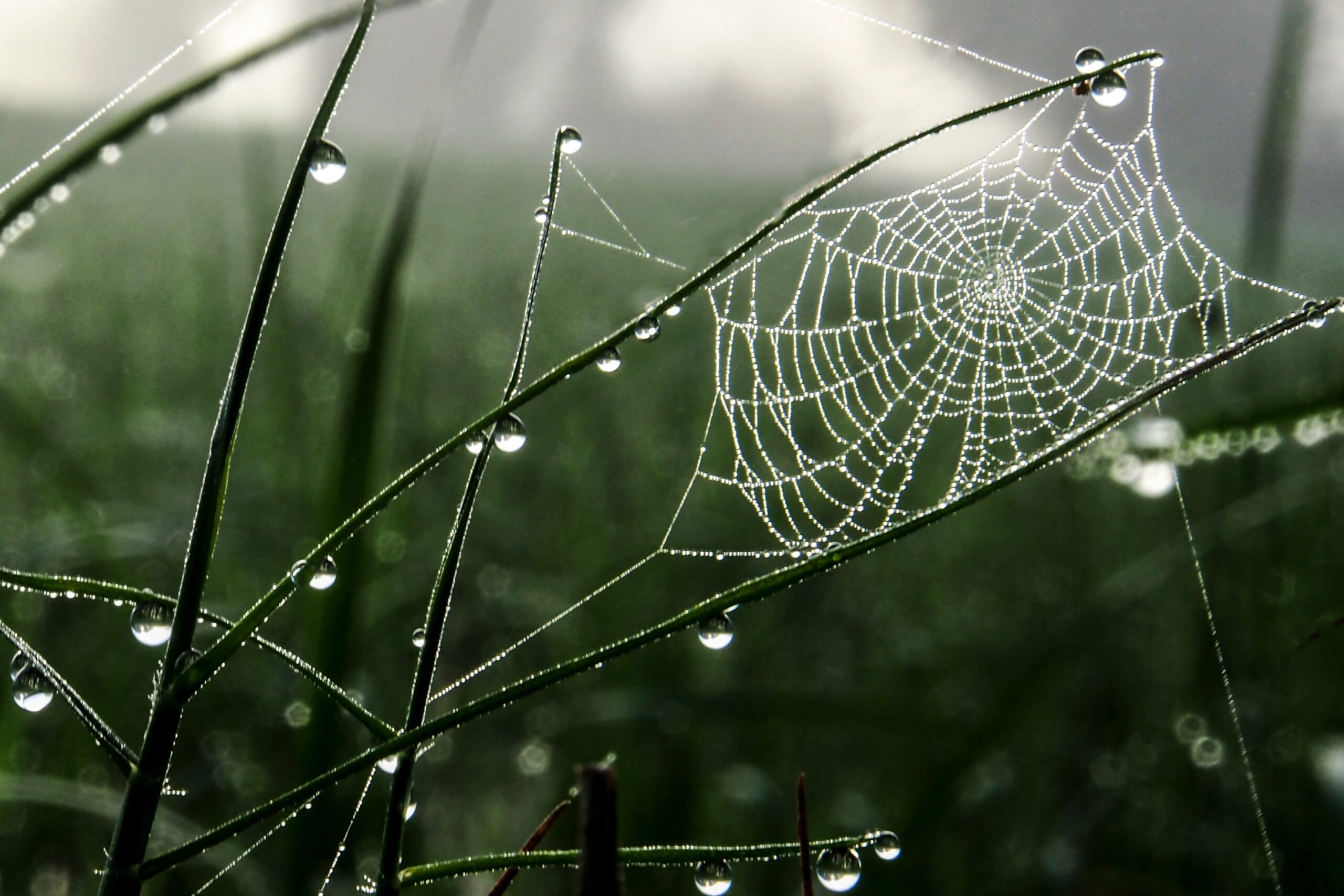
Web-building spiders are equipped with all of the tools they need to craft their intricate webs. Spider silk is essentially a protein-filled fiber that starts as silk in the spider’s body and is secreted as liquid threads at the spider’s will. Each spider has a set of spinnerets — silk-spinning organs — on its abdomen. Each spinneret has a spigot that releases the spider silk when the spider makes its web. Every species has a different number of spinnerets, hence why each spider creates a uniquely-shaped web.
Spiders only create webs in places that they not only see enough food sources, but also feel safe enough to stay. Dark and dry areas are favored by most spider species, especially when it’s raining outside. Spiders like to attach their threads to sturdy items and make some sort of pattern. For instance, orb weavers spin webs that look like a big wheel. The wide shape catches quite a few bugs for the hungry spider, who bites its captured prey to paralyze it before eating.
Why Don’t Spiders Get Stuck In Their Webs?
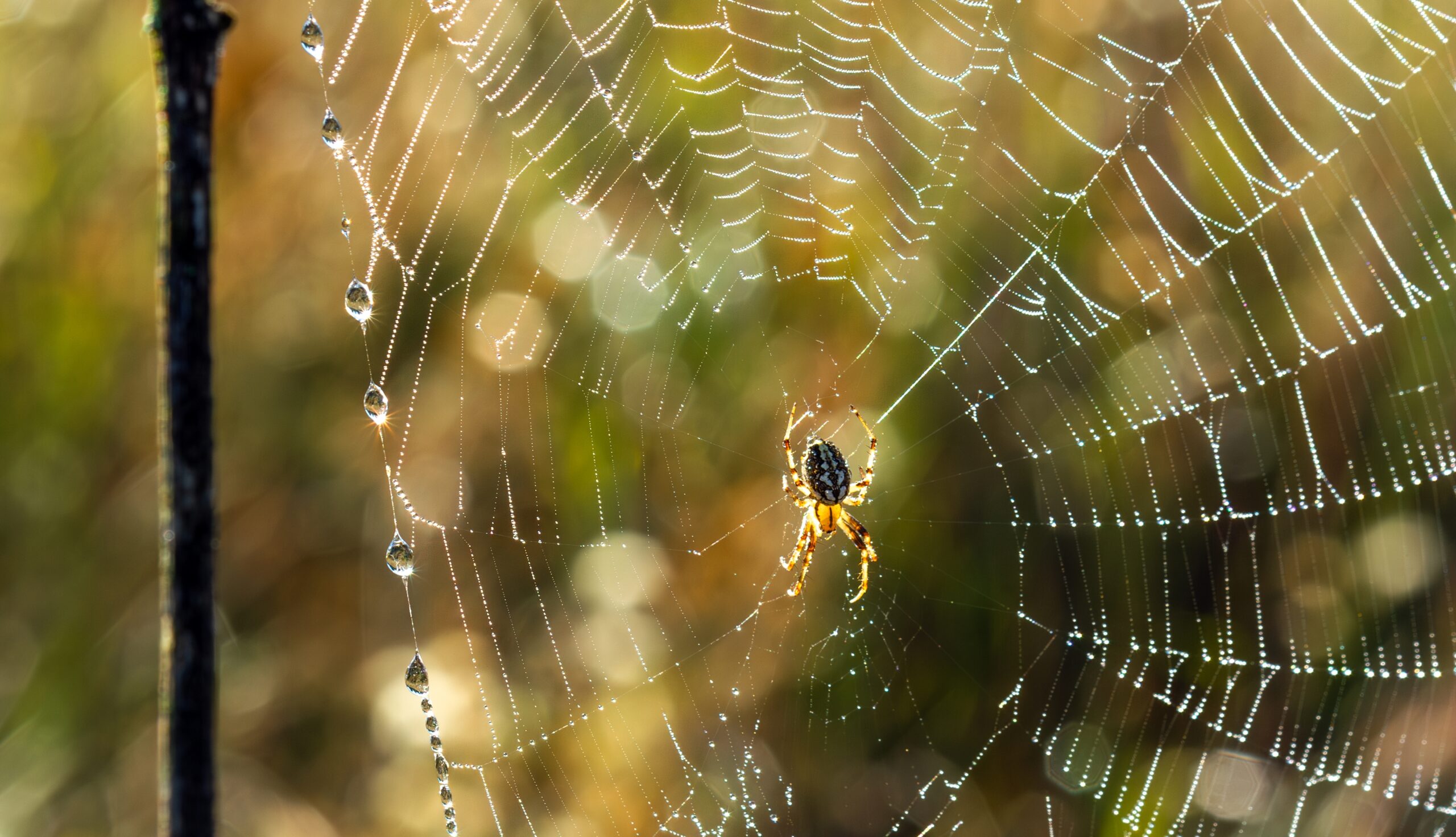
Speaking of webs, it’s interesting to note that spiders don’t get caught in their own sticky webs. You’d think that a spider would accidentally get its foot stuck every now and then, but no! Spiders are careful to walk on the tips of their feet because they have a non-stick substance on the edges of their legs. They create small glue dots on the web to catch their prey, so they take care to avoid these as they walk around. The “claw” on the end of each leg also grips the web as the spider walks, which helps them to stay balanced on the thin strands.
Is a Daddy Longlegs a Spider?

The short answer to this is “no.” Daddy longlegs is an arachnid and related to spiders, but it’s not a true spider. Also known as harvestmen, daddy longlegs are harmless creatures that look much creepier than they actually are. They don’t have venom or fangs, as opposed to actual spiders that have both. Daddy longlegs eat decomposing vegetable and animal matter, so they feel right at home in a garden.
Daddy longlegs are also unique because they have:
- Extremely long legs (of course)
- The ability to grow a new leg when they lose one
- A preference for moisture
- One body section
- The inability to make webs
How Long Do Spiders Live?
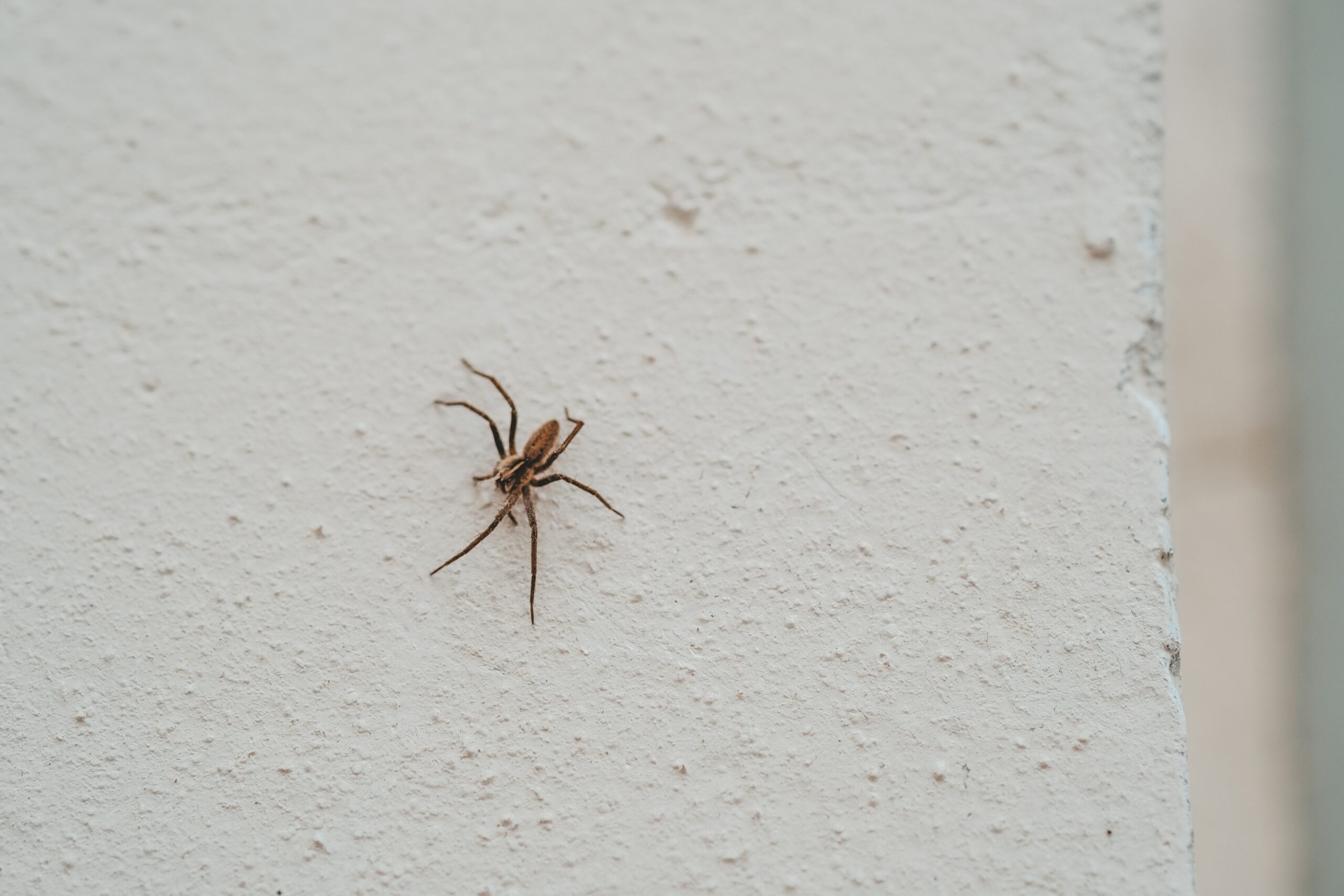
As with any other creature, the lifespan of spiders differs depending on the species. Female spiders carry egg sacs that can have up to 1,000 eggs inside, so there’s no doubt that we’ll always have spiders around! Since spiders can overwinter as eggs and don’t need to eat every day, they thrive in all kinds of environments. A spider’s gender also impacts its life expectancy because female spiders generally live longer than male spiders. Of course, some female spiders eat their mates after mating, but that’s neither here nor there.
All of these are general numbers, but here are the life expectancies of common spiders:
- House Spiders: 1 year
- Black Widows: 3 years
- Brown Recluses: 1 to 2 years
- Wolf Spiders: 1 year
What Do Spiders Eat?
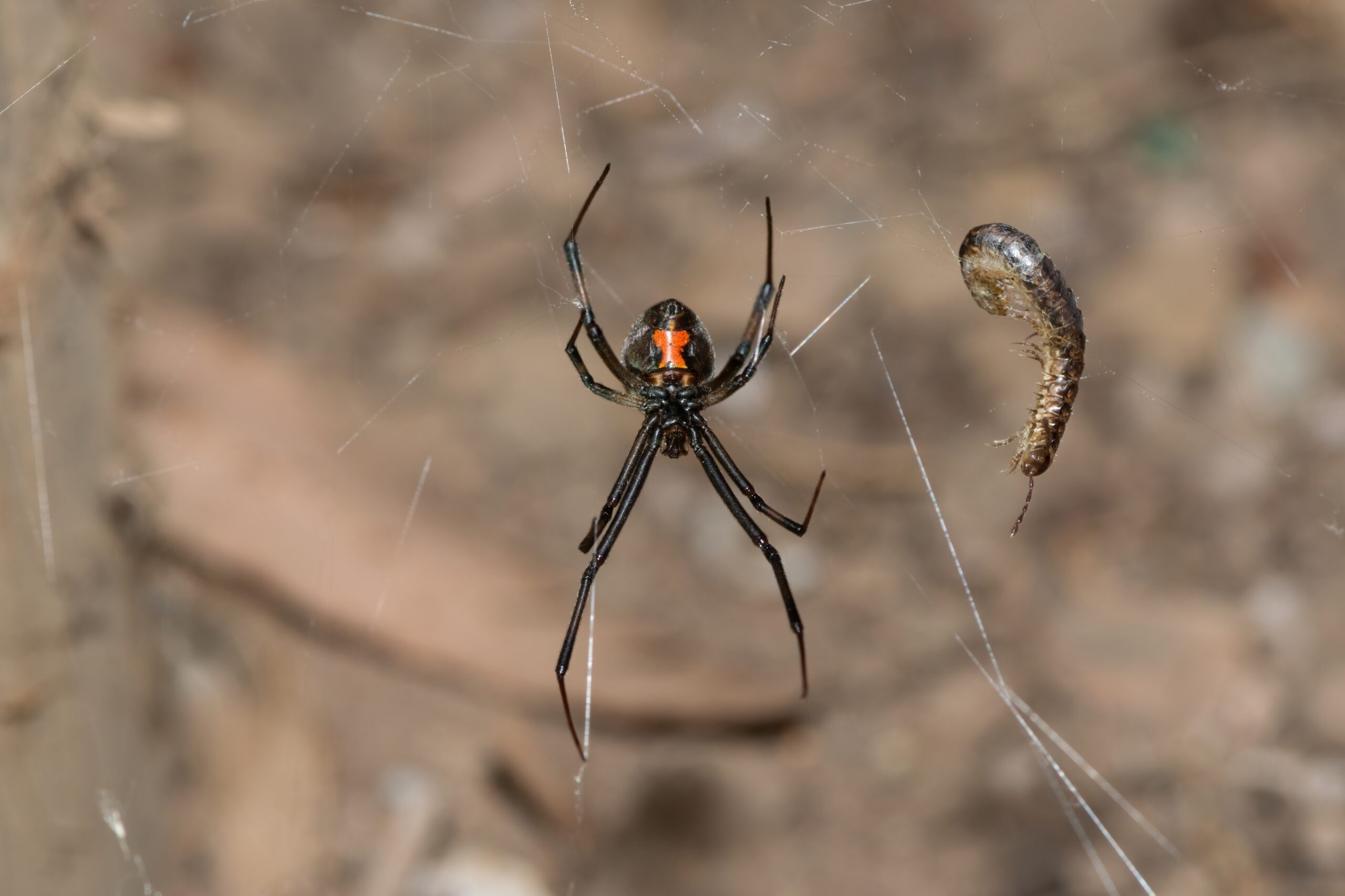
Certain spiders eat plants, but most of the spiders we see devour other arthropods. These are small invertebrates with exoskeletons, such as insects and spiders. Most hunting and web-building spiders eat small pests because they’re reliable sources of protein. Hunting spiders seek out critters in their habitats, while web-building spiders wait for their prey to become ensnared in the strands.
Spiders generally prefer their prey to be either alive or recently killed. They grab the critter with their pedilaps (front leg-like structures) and inject venom to paralyze the prey. The spiders we see in our yards usually eat other smaller pests, like crickets, mosquitoes, butterflies, moths, and beetles. Larger spiders eat lizards, birds, and bats, but we (thankfully) don’t see these arachnids here.
What Are Spiders Attracted To?

Basically, any space that’s warm and dark is appealing to a spider. They’re often found near a preexisting pest problem because it gives them a reliable food source from the start. They also like clutter because the strewn belongings give them a huge number of hiding spaces. Spiders are active year-round, but they’re found indoors in the winter to escape the rain and snow. That being said, they don’t want to completely avoid water forever! Spiders also need a water source, so they might hide in spaces with excess moisture. Bathrooms, laundry rooms, garages, and basements are popular rooms for spiders because of this.
Why Do Spiders Bite?
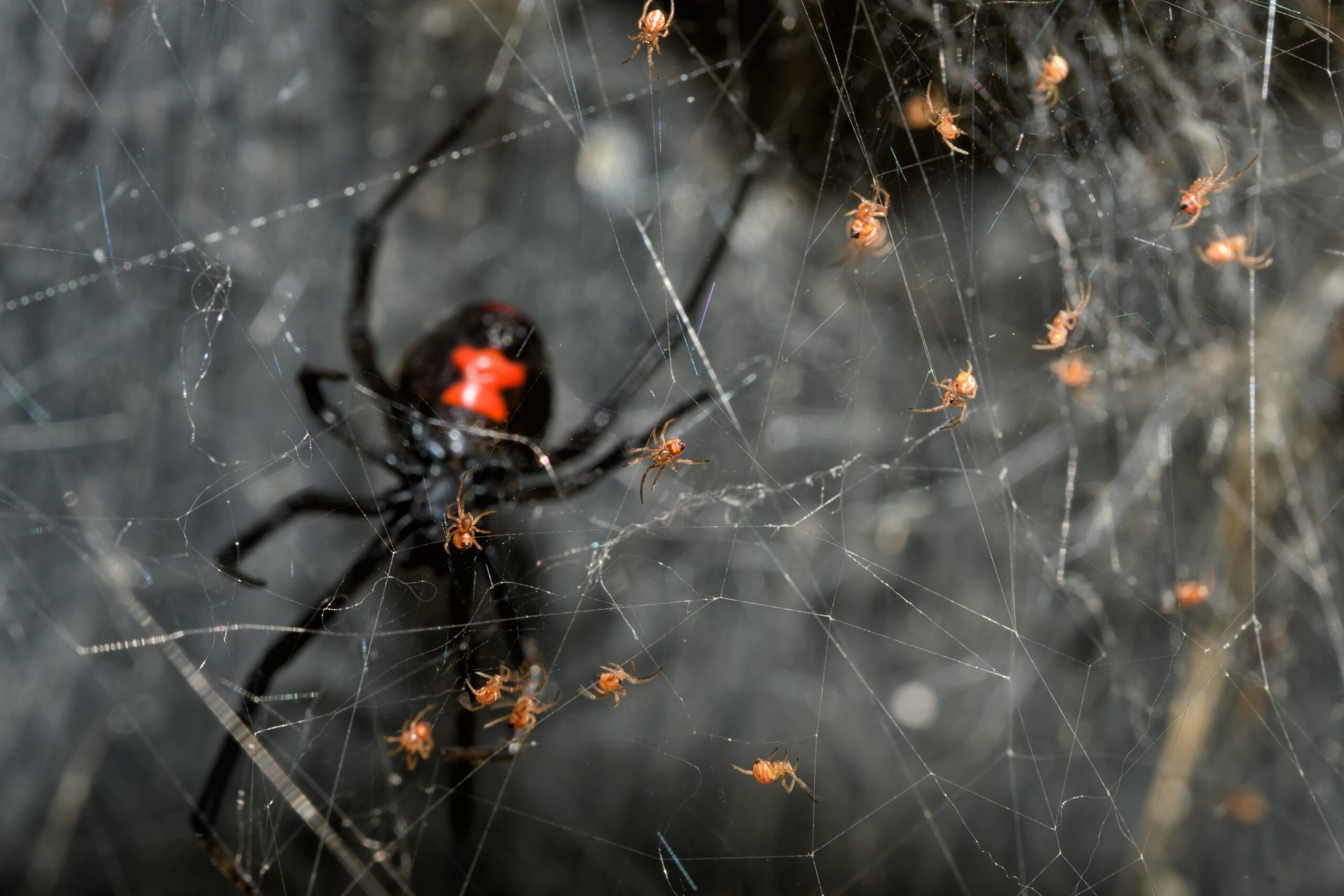
First of all, one detail to note is that spiders don’t want to bite us. They don’t eat blood and prefer to avoid us at all costs, so it’s not like spiders seek out people to bite all the time. But a spider’s bite is its main defense against any kind of predator, and that includes humans on certain occasions. If a spider feels threatened when it comes in contact with a human, it will sink its fangs into our skin. Their venom and fangs aren’t usually enough to impact us, so spider bites are not always a medical emergency.
If you get bitten by a random spider, washing the site before putting an ice pack on it and elevating it should do the trick. However, there are two infamous spiders that are best left alone. Black widows and brown recluses both have venomous bites that can be lethal if left untreated. Brown recluses attack when their hiding spots are disturbed, and black widows hate when their webs are ruined. Common bite symptoms include muscle cramps, swelling, nausea, fever, and blistering. If you are bitten by either of these spiders, please seek medical attention immediately.
Does Green Eliminate Spiders? (The Answer is Yes!)
A lone spider in the corner of the garage doesn’t necessarily mean that you have an infestation, but spiders are a unique pest. Since they’re independent and are only seen with other spiders when they reproduce, spider issues typically occur when they have a good reason for invading that place. Instead of allowing these creepy-crawlies to inhabit your home, leave the hassle of spider control to the experts at Green Pest Services! Our experienced technicians solve spider (and other pest) issues with a combination of thorough inspections, targeted treatments, and web removal. For a free quote on the best spider control services around, contact us today!
Citations
Ben-Joseph, E.P. (Dr.). (2021, July). Spider bites. Nemours Kids Health. Available at https://kidshealth.org/en/parents/spider-bites.html (Accessed on June 20, 2024).
Daddy long legs. (n.d.). UC Riverside: Spider Research. Retrieved June 20, 2024, from https://spiders.ucr.edu/daddy-long-legs
Hendry, L. (n.d.). What are spider webs made of? And how do they spin them?. Natural History Museum. Available at https://www.nhm.ac.uk/discover/what-are-spider-webs-made-of.html (Accessed on June 20, 2024).
How long do spiders live?. Exploring the average life cycle. (n.d.). Earthkind. Retrieved June 20, 2024, from https://www.earthkind.com/blog/long-spiders-live-exploring-spider-life-cycle/
Myth: A “daddy-longlegs” is a kind of spider. (n.d.). Burke Museum. Retrieved June 20, 2024, from https://www.burkemuseum.org/collections-and-research/biology/arachnology-and-entomology/spider-myths/myth-daddy-longlegs-kind-spider
Villazon, L. (n.d.). Why don’t spiders get caught in their own web?. BBC Science Focus. Available at https://www.sciencefocus.com/nature/why-dont-spiders-get-caught-in-their-own-web (Accessed on June 20, 2024).
What do spiders eat?. (n.d.). Raid. Retrieved June 20, 2024, from https://www.raid.com/en-US/education/bug-basics/what-do-spiders-eat
How Do Pests Contaminate Food?
How Do Pests Contaminate Food? How Do Pests Contaminate Food? Summary: A practical homeowner guide explaining how pests contaminate food through contact, saliva, [...]
The Clear Signs of Bed Bugs in Every Setting
The Clear Signs of Bed Bugs in Every Setting The Clear Signs of Bed Bugs in Every Setting Summary: A setting-by-setting guide to [...]
Odor is an Early Sign of Rodents, Here’s Why
Odor is an Early Sign of Rodents, Here’s Why Odor is an Early Sign of Rodents, Here’s Why Summary: Rodent odors are often [...]
Pest Prevention Tips for Snowy Days
Pest Prevention Tips for Snowy Days Pest Prevention Tips for Snowy Days Summary: Snowy weather pushes pests to seek warmth and shelter indoors, [...]
How Do Ants Spend Winter? What Homeowners Should Know About Ants in Winter
How Do Ants Spend Winter? What Homeowners Should Know About Ants in Winter How Do Ants Spend Winter? What Homeowners Should Know About Ants in [...]
Termites Are Awful Winter Pests – Here’s Why
Termites Are Awful Winter Pests – Here’s Why Termites Are Awful Winter Pests – Here’s Why Summary: Termites can remain active through winter [...]

